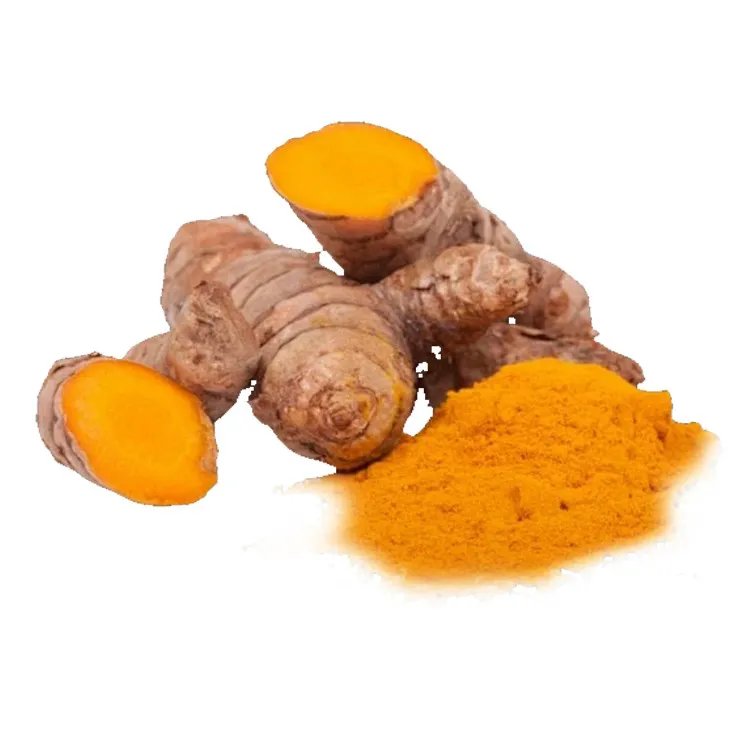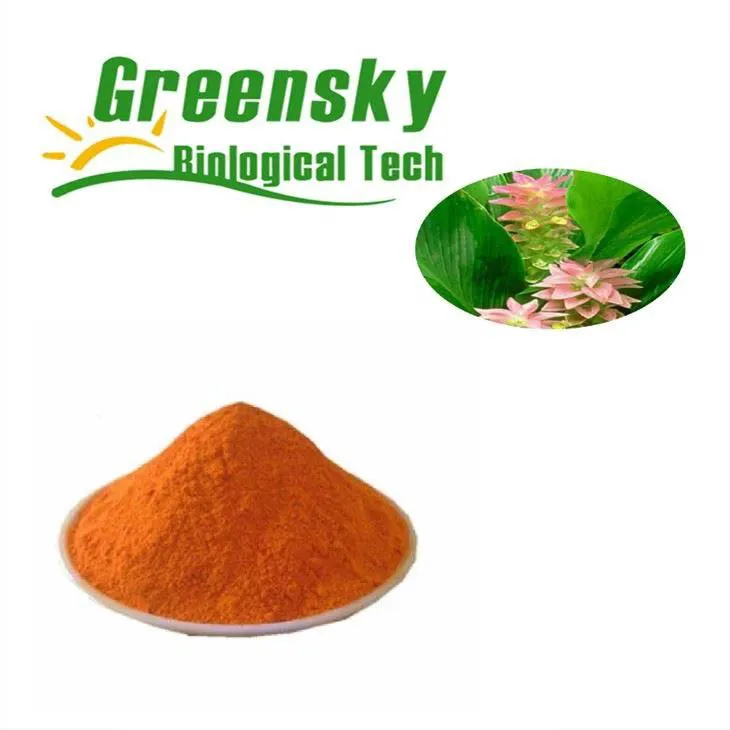- 0086-571-85302990
- sales@greenskybio.com
Does curcumin cleanse the liver?
2025-08-26

In the world of herbal remedies and natural supplements, Curcumin stands out as the principal bioactive compound in turmeric, a golden spice renowned for its vast array of health benefits. Turmeric has been used for thousands of years across various cultures in culinary and medicinal practices. Curcumin, the active component, is particularly celebrated for its potent anti-inflammatory and antioxidant properties, which play a significant role in supporting liver health. This article delves into whether Curcumin can effectively cleanse the liver, examining scientific evidence, its mechanism of action, and its broader implications for liver health.
Understanding Curcumin
Curcumin is a polyphenol found in the rhizome of the turmeric plant (Curcuma longa), accounting for its signature bright yellow color. The compound is lauded for its antioxidant, anti-inflammatory, and anti-microbial effects, making it a popular choice for promoting overall health and addressing various ailments.

The Liver's Role and Need for Cleansing
The liver is a vital organ responsible for detoxifying the blood, metabolizing nutrients, producing bile acids, and regulating hormones—making liver health critical for overall well-being. The body's detoxification processes routinely rely on liver function to break down and eliminate toxins. Factors like poor diet, alcohol consumption, and exposure to environmental pollutants can burden the liver over time, highlighting the importance of methods to support liver detoxification.

Curcumin's Impact on Liver Health
Antioxidant Power: Curcumin's antioxidant properties contribute to its potential for liver support. By neutralizing free radicals, curcumin protects liver cells from oxidative damage—a key factor in maintaining liver function and preventing chronic liver diseases. Enhanced antioxidant defenses enable the liver to execute detoxification processes efficiently, reducing the risk of accumulation of harmful substances.
Anti-Inflammatory Benefits: Chronic inflammation is often linked to impaired liver function and diseases such as fatty liver disease, hepatitis, and cirrhosis. Curcumin shows considerable promise in modulating inflammatory pathways, inhibiting the production of inflammatory cytokines that exacerbate liver damage. Its anti-inflammatory effects can help alleviate liver inflammation and support regenerative processes, which are crucial for liver repair and regeneration.
Support for Liver Enzymes: Liver enzymes are integral to the organ's detoxification processes. Studies suggest that curcumin can help modulate liver enzymes, including those involved in the breakdown and excretion of toxins. By supporting healthy enzyme function, curcumin contributes to the overall efficiency of the liver's detoxification efforts.
Protection Against Liver Disease: Preclinical studies underscore curcumin's protective effects against various liver disorders. For instance, research indicates curcumin's ability to prevent the progression of non-alcoholic fatty liver disease (NAFLD) by reducing fat accumulation and improving lipid metabolism in liver cells. Moreover, curcumin's potential role in mitigating liver fibrosis and damage induced by alcohol or toxins showcases its preventive capabilities.
Enhanced Bile Production: Curcumin is believed to stimulate bile flow, aiding in digestion and the elimination of waste products. Efficient bile production and movement are key to the liver's detoxification process, enabling the removal of fat-soluble toxins and waste, thus promoting a cleaner liver environment.

Research and Studies
Numerous studies have explored the protective role of curcumin in liver health. In animal models, curcumin demonstrated significant reduction in liver enzyme markers related to injury, showcasing its therapeutic potential. Human trials, while still ongoing, suggest a promising role for curcumin in reducing liver inflammation and steatosis (fatty accumulation), particularly for individuals at risk of NAFLD.
While current evidence supports curcumin's beneficial effects on liver health, further research, including larger-scale human studies, is necessary to fully understand dosing parameters, long-term effects, and clinical applications.

Incorporating Curcumin into Your Diet
Curcumin can be effectively integrated into the diet through a variety of methods:
Turmeric Spice: Adding turmeric powder to daily cooking—seasoning dishes, making tea, or blending with smoothies—provides a natural dose of curcumin. Combining turmeric with black pepper enhances curcumin absorption due to the presence of piperine, a compound found in pepper.
Curcumin Supplements: For those seeking higher doses of curcumin, supplements are available. Ensuring the supplement includes piperine for better absorption will enhance its efficacy. Consulting with a healthcare provider to find the appropriate dosage tailored to individual health needs is advised.
Golden Milk: A popular wellness beverage, golden milk combines turmeric with milk (or plant-based alternatives), spices, and sweeteners. Regular consumption can enrich daily intake and support liver health alongside other benefits.

Considerations and Safety
While curcumin offers a range of health benefits, certain considerations apply:
Dosage Sensitivity: Excessive intake of curcumin supplements may lead to gastrointestinal upset or risk interactions with medications. It's vital to adhere to recommended doses and seek professional guidance, particularly if dealing with liver-related conditions.
Pregnancy and Health Conditions: Pregnant or nursing women should consult a healthcare provider before using curcumin supplements, as safety during pregnancy requires careful consideration. Individuals with gallbladder issues or kidney stones should also seek professional advice.
Individual Variation: As supplement efficacy can vary, paying attention to body responses, identifying potential allergies, and discussing any adverse effects with a healthcare provider can promote safe and effective use.
Conclusion
Curcumin is a promising natural compound for supporting liver health, showcasing potential benefits in enhancing detoxification processes, reducing inflammation, and protecting against liver disease progression. Though it plays a valuable role in promoting liver health, curcumin should be used thoughtfully within the context of an overall balanced diet and healthy lifestyle. While more studies are necessary to solidify its place in liver health protocol, the current evidence underscores curcumin's vital contributions to maintaining a resilient, well-functioning liver as part of comprehensive wellness.
- ▶ Hesperidin
- ▶ citrus bioflavonoids
- ▶ plant extract
- ▶ lycopene
- ▶ Diosmin
- ▶ Grape seed extract
- ▶ Sea buckthorn Juice Powder
- ▶ Beetroot powder
- ▶ Hops Extract
- ▶ Artichoke Extract
- ▶ Reishi mushroom extract
- ▶ Astaxanthin
- ▶ Green Tea Extract
- ▶ Curcumin Extract
- ▶ Horse Chestnut Extract
- ▶ Other Problems
- ▶ Boswellia Serrata Extract
- ▶ Resveratrol Extract
- ▶ Marigold Extract
- ▶ Grape Leaf Extract
- ▶ blog3
- ▶ Aminolevulinic acid
- ▶ Cranberry Extract
- ▶ Red Yeast Rice
- ▶ Red Wine Extract
-
Milk Thistle Extract
2025-08-26
-
Marigold Extract
2025-08-26
-
Astaxanthin
2025-08-26
-
Cat Claw Extract
2025-08-26
-
Alfalfa Meal
2025-08-26
-
Saponin Extract
2025-08-26
-
Rosemary extract
2025-08-26
-
Green Tea Extract
2025-08-26
-
Citrus bioflavonoids
2025-08-26
-
Black Rice Extract
2025-08-26





















